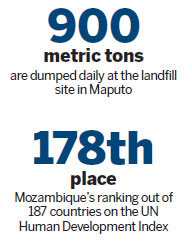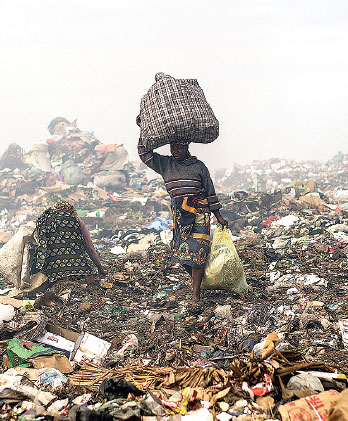Dump offers living amid Maputo's stark poverty gap
In an acrid brown fog, hundreds of figures like ghosts pick their way across an ocean of garbage.
A truck arrives and people rush from all sides. Children clamber up on the vehicle's tailboard and tear frantically at its contents, unleashing an avalanche of leftovers, shredded paper, bottles and tin even before the truck has come to a stop.
This truck is the one 13-year-old Jason Matthias has been waiting for. It comes from a posh area with several luxury hotels.
Jason grins as he displays his prize - a cream puff pastry still in its packaging - before wolfing it down.
Asked to name the toughest part of life at the dump, the shy teenager pauses to think. "Hunger," he whispers.
More than 900 metric tons of waste are dumped daily in this landfill in Mozambique's capital, Maputo, a city of more than a million people.
Over an area the size of 17 football fields, garbage is piled as high as a three-story building.
Jason and his mother are among at least 500 catadores, or collectors, who depend on what they can unearth here. Most are women and children, the most vulnerable members of society, who have no other options.
Like a parallel universe
Maputo's five-star hotels, shopping malls and high-rise apartments are only a few kilometers from the dump but they might as well exist in a parallel universe.
The frenetic pace of economic growth, in a nation rich in coal and gas, is only evident at the dump in terms of more garbage than ever.
The southern African country has been ranked among the 10 fastest-growing economies in the world in the past decade.
The annual growth of 7.5 percent is expected to continue in 2014 and 2015, according to the International Monetary Fund.
But 22 years after the end of the civil war, Mozambique still ranks 178th out of 187 countries on the United Nations annual Human Development Index.
Going barefoot is not an option. Apart from the usual hazards like broken glass lurking in the waste, abandoned weaponry including live ammunition is sometimes unearthed.
The dump gives off toxic methane gas and just a few hours on the Hulene landfill can leave your lungs aching.
It is considered a health hazard by people living close by. In the rainy summer months the stench is unbearable and swarms of flies invade houses. Several public protests have been staged to get it closed.
When Mozambique's Portuguese colonial rulers chose the site half a century ago, it was well outside the city's limits but after uncontrolled urbanization, Maputo engulfed the dump.
In 2007, authorities announced that they would close the dump and move it 20 km away, outside the city's modern limits.
After numerous delays the municipality says it is going ahead after securing funding from South Korea but is unlikely to be ready before 2016. It is unclear what will happen to the catadores when it closes.

|
People known as catadores, or collectors, sift through garbage at the Maputo municipal garbage dump site in order to make a living from what they can unearth. Most are women and children, the most vulnerable members of society. Gianluigi Guercia / Agence France-Presse |
(China Daily 12/16/2014 page10)















